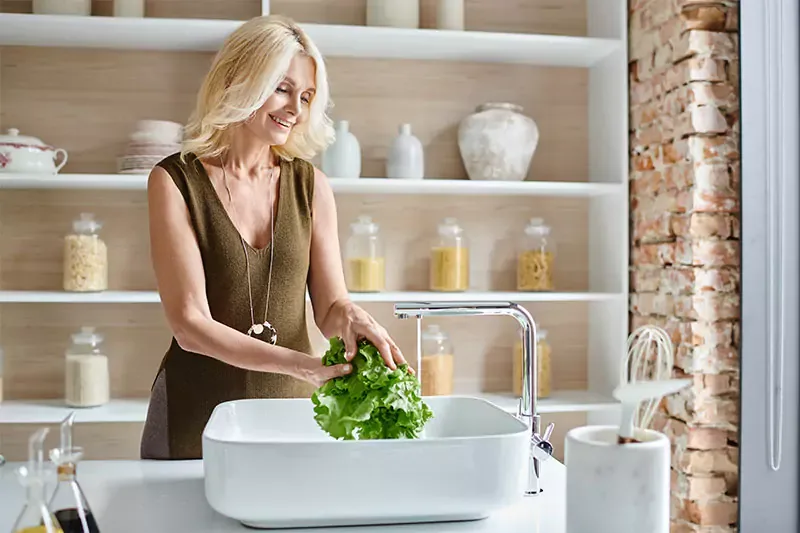Approximately 60% of postmenopausal women are believed to experience vaginal dryness, which can lead to discomfort, itching, and other distressing symptoms.(1) Despite its prevalence, many women feel embarrassed to discuss it with their physician. And some may avoid seeking medical advice because they consider vaginal dryness an unavoidable part of aging.
It’s important to understand that while vaginal dryness may be a common occurrence during menopause, effective treatments are available to manage it. Options include vaginal moisturizers, hormone replacement therapy (HRT), and lubricants. Certain foods and home remedies may also serve as natural vaginal moisturizers. This article explores effective natural options that may help alleviate vaginal dryness.
7 Foods That Naturally Enhance Lubrication
A well-balanced diet is essential for maintaining vaginal and overall health. Experts recommend certain foods that may help alleviate vaginal dryness by supporting natural lubrication and hormonal balance. Below are some foods that may offer these benefits:
1. Salmon
This fish is rich in omega-3 fatty acids, which are healthy fats that support vaginal lubrication and improve blood circulation, helping to reduce dryness. Other sources of omega-3s include mackerel, tuna, and seeds like pumpkin and sunflower.(3)
2. Soybeans
A 2019 journal article indicates that soybeans are a good source of isoflavones, which are naturally occurring plant compounds that can mimic the effects of estrogen. The article suggests that isoflavones may help relieve vaginal dryness in a way similar to estrogen therapy. However, more research is needed to confirm this benefit.(4)
3. Leafy Greens
These are packed with dietary nitrates, which help promote healthy circulation and tissue integrity. The beneficial properties of leafy greens can help maintain vaginal moisture and reduce dryness.(5) Spinach, chard, kale, and collard greens are some great options.

4. Sweet Potatoes
A deficiency in vitamins A, E, and beta-carotene is linked to vaginal dryness. Sweet potatoes are a natural source of these vitamins, especially vitamin E, which may help improve symptoms of vaginal atrophy, including dryness.(6)(7)
5. Yogurt
Probiotic-rich yogurt can help maintain a healthy vaginal pH, potentially preventing infections that can lead to dryness and irritation.(8) Other beneficial fermented foods include sauerkraut, kombucha, and kimchi.
6. Avocados
Known for their healthy fats, avocados are rich in vitamins C and E, which may help improve vaginal lubrication and strengthen vaginal walls.(7)(9)(10)
7. Cranberry Juice
Unsweetened cranberry juice is often recommended for maintaining vaginal pH balance and reducing irritation. It’s also a good source of vitamins C and E, which contribute to overall vaginal health.(7)(10)(11)
Other Remedies for Vaginal Itching and Dryness
Estrogen and progesterone play a key role in maintaining the health and moisture of the vaginal walls. The decline in these hormones during menopause may cause the vaginal walls to become thinner and less elastic, resulting in dryness that may cause symptoms like itching and pain during intercourse.
HRT can help manage these symptoms by reducing vaginal dryness and addressing related issues like bladder problems and infections.(12)
Experts often recommend topical estrogen treatments, such as creams and patches, as well as vaginal tablets for dryness. These treatments work directly on the vaginal tissue, helping to restore moisture and relieve discomfort. Because topical estrogen options use lower doses of estrogen applied locally, they can be a more targeted treatment.(12)
For those dealing with both hot flashes and vaginal dryness, systemic estrogen treatment (with progesterone for patients with a uterus) might be a better fit. These treatments work systemically, addressing a broader range of symptoms. However, if vaginal symptoms are the main concern, localized treatments like estrogen creams or vaginal suppositories are usually recommended.
Another option involves dehydroepiandrosterone (DHEA), a hormone precursor that the body converts into small amounts of testosterone. Low-dose vaginal DHEA has been shown to improve vaginal health and relieve painful intercourse caused by thinning vaginal tissue.(12)
Alternative Approaches for Vaginal Dryness and Atrophy
Exploring various options to manage vaginal dryness can be beneficial, as different strategies target specific aspects of vaginal health. Here are some alternatives that may provide relief:(12)(13)
Using Over-the-Counter (OTC) Lubricants: Water-based or silicone lubricants can help manage pain and discomfort associated with vaginal dryness.
Engaging in Sexual Activity: Regular sexual activity increases blood flow to the vaginal area, maintaining elasticity and natural lubrication.
Prioritizing Sleep: Good sleep quality supports hormonal balance and overall health, which can alleviate symptoms of vaginal irritation.
Addressing Yeast Infections: If a yeast infection is causing discomfort, OTC antifungal treatments can quickly restore balance and relieve symptoms.
Avoiding Douching: Douching disrupts the natural vaginal flora, which can lead to irritation and infections. Maintaining balance in the vaginal area is crucial for comfort.
Opting for Gentle Products: Choosing vaginal products without perfumes, herbal extracts, or artificial colors can minimize the risk of allergic reactions and irritation, helping to keep the area healthy.
Monitoring for STDs: Recognizing and addressing sexually transmitted diseases (STDs) is important, as they can lead to symptoms like itching or dryness. Early intervention can prevent complications.
Practicing Pelvic Floor Therapy: Strengthening the pelvic muscles through exercises can enhance overall vaginal function and health, improving comfort during daily activities and intimacy.